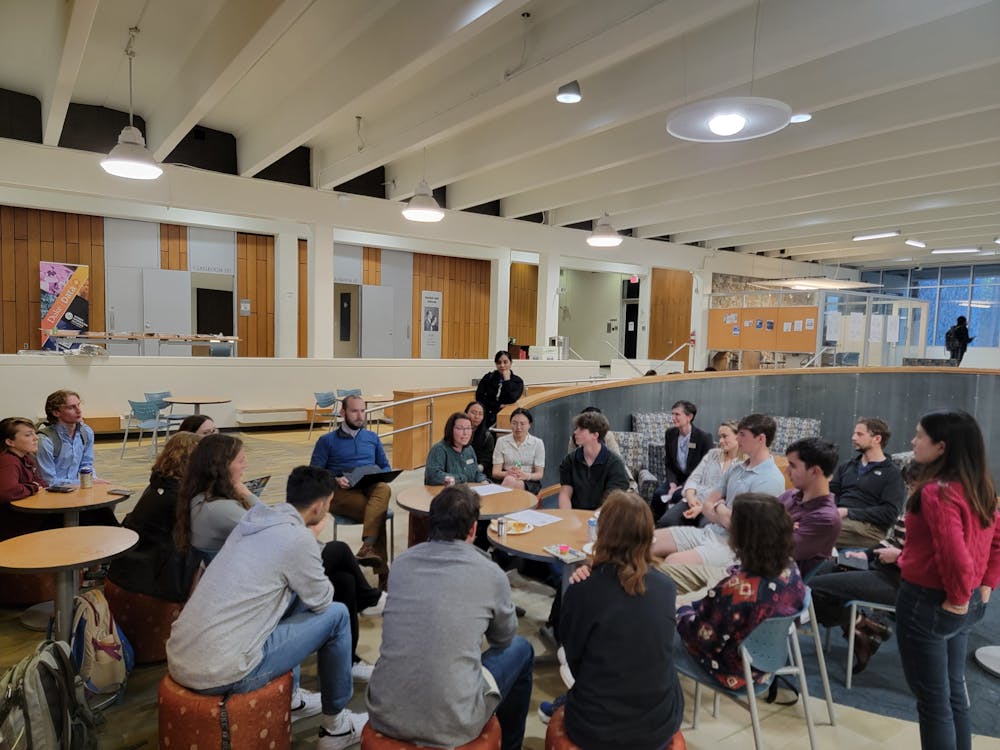The Duke Office of Climate and Sustainability (OCS) hosted a town hall Thursday evening to engage student perspectives on existing initiatives and areas for improvement regarding the Duke Climate Commitment.
The Climate Commitment, first announced in September 2022, represents a “university-wide, impact-oriented initiative to address the climate crisis by creating sustainable and equitable solutions that place society on the path toward a resilient, flourishing, carbon-neutral world,” according to its website.
“The idea is that we’re taking the entire mission of the University and forcing it through the prism of climate and sustainability,” said Toddi Steelman, vice president and vice provost of climate and sustainability.
Climate Commitment context
The event, hosted in the Gross Hall Energy Hub Atrium, was the first in-person student town hall. Climate Commitment leaders previously hosted two virtual town halls in February and October 2023 to share updates and field student questions.
Steelman gave introductory remarks alongside Tavey Capps, executive director of climate and sustainability. They reviewed the Climate Commitment’s five central pillars — research, education, external engagement, operations and community connections — and the functions of the new OCS, which was officially created Oct. 13 to coordinate the work of Sustainable Duke, the Nicholas Institute for Energy, Environment & Sustainability, the Duke Forest, the Sarah P. Duke Gardens and the Duke Campus Farm.
Capps introduced the Climate Commitment Advisory Council (CCAC), “a new, senior-level committee advising the president, the executive vice president and other senior leaders on Duke’s climate and sustainability efforts.”
The Council, composed of students and faculty members, includes four subcommittees geared toward driving University action across the Climate Commitment’s main pillars, with community connection goals incorporated throughout the other four.
Organizers also presented written responses to several questions they received before the event, which were posted in the main atrium for participants to read through on their own time. The main topics of interest included dining, transportation, waste and procurement, operations and divestment.
Student input
Based on student feedback from previous town halls, Capps explained that organizers wanted the town hall “to be less formal [and] have more time for conversation.” She invited students to move throughout various classrooms on the first floor of Gross Hall, forming in-person breakout groups to provide feedback to Climate Commitment leaders.
The organizers asked students for advice on how to best engage the student body in their efforts to keep all members of the Duke community informed on the Commitment’s goals and efforts and provide opportunities for interested students to get involved.
Students offered a variety of possible strategies, including instituting a weekly newsletter with initiative updates and upcoming events, communicating through professors to reach a wide range of students and using social media posts and flyers in prominent locations on campus.
The remaining sessions were focused on four topics relating to the Climate Commitment’s main functions: education, research, campus operations and JEDI — justice, equity, diversity and inclusion.
“The goal of our educational efforts is to imbue the Duke student body with a sense of climate and sustainability fluency,” said Katie Douglas, associate director of administration and program development in the OCS, i.
A working group in the CCAC’s education subcommittee created a preliminary “4C Fluency Framework” to guide the incorporation of climate and sustainability across departments, which students provided generally positive feedback on.
One student suggested that climate and sustainability content be included in introductory courses so that students are able to engage with climate issues earlier in their degree program trajectory.
In terms of research, the Climate Commitment’s main priority areas are transforming energy, fostering climate-resilient communities and ecosystems, elevating environmental and climate justice, and developing data-driven climate solutions.
Student discussion touched on issues of water resources, biodiversity loss, health disparities and data availability. Equity concerns were a crucial priority for many participants, with questions around how climate change disproportionately impacts marginalized communities.
Students also pointed to opportunities for interdisciplinary study, pointing to existing programs like RESILE — Risk Science for Climate Resilience — and Bass Connections and advocating for research that facilitates collaboration across the University’s undergraduate and professional schools.
The operations pillar deals with promoting sustainability across University facilities, with special attention paid to energy use, transportation, food sourcing and procurement, waste management and carbon emissions.
Lindsay Batchelor, sustainability director at Sustainable Duke, noted that the University is on track to reach its carbon neutrality goal by the end of 2024 and is looking to identify a “second-generation climate goal” to guide future work.
The most common suggestion from students was to divest Duke’s endowment from fossil fuels, a demand first made in 2012 by student group Divest Duke, now Duke Climate Coalition. The Advisory Committee on Investment Responsibility recently released a report advising President Vincent Price not to pursue divestment, citing a lack of “compelling evidence that divesting from fossil fuel companies would achieve the desired outcome.”
Other points of interest were improving waste diversion programs on campus and introducing initiatives geared toward changing student behavior to promote more sustainable habits.
The final breakout group focused on justice, equity, diversity and inclusion initiatives associated with the Climate Commitment.
Students advised the OCS to pursue engagement strategies that are community-led and non-extractive. They also emphasized the importance of encouraging diverse speakers at Duke conferences and expanding student access to resources to make participating in climate-related events more accessible.
Get The Chronicle straight to your inbox
Signup for our weekly newsletter. Cancel at any time.

Zoe Kolenovsky is a Trinity junior and news editor of The Chronicle's 120th volume.

